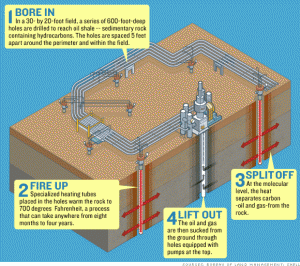The fact that there is an abundance of shale oil which is a high energy fuel really doesn’t change anything in terms of the infrastructure that the transition towns movement is engaged in building for a future low energy world. It might well be the case that there is a 1.5 trillion barrels of shale oil underground, although the figures of just how much there is are said to be exaggerated by the Oil industry and their marketers according to the Post Carbon Institute. There are a few ecological considerations that here need to be addressed. The cost of extracting this high energy oil from shale is hitting precious water supplies in theUSalready, and this is before the industry goes into full swing and begins extracting on a truly industrial level.
What is Shale Oil?
To put it simply shale oil is oil that is trapped in rock and thus has to be processed to obtain a yield from the shale which then processed further before it finally ends up as a usable fuel. Oil shale is a different substance to Shale Oil, Oil Shale is in fact rock that has compounds which can eventualy become oil when added to other compounds, where as oil shale are rock or shale formations that do actually contain oil.
How is it extracted?
Extracting oil from the shale is not a simple task by any means. The first attempts to extract the oil used an environmentally unfriendly process known as “retorting.” State Retorting required mining the shale, hauling it to a processing facility that crushed the rock into small chunks, then extracted a petroleum substance called kerogen, then upgraded the kerogen through a process of hydrogenation (which requires lots of water) and refined it into gasoline or jet fuel. However, a new technology has emerged, Royal Dutch Shell, has recently completed a demonstration project in which it produced 1,400 barrels of oil from shale in the ground, without mining the shale at all.They used a process called “in situ” mining, which heats the shale while it’s still in the ground, to the point where the oil leaches from the rock. 
What are the Ecological consequences?
Since we already in a changing climate where the polar ice caps are rapidly melting and unseasonal weather and droughts are becoming common place, we really need to ask ourselves, do we need another oil era when we consider the immense damage caused by this one both ecologically and in terms of millions of people either being displaced from their homes or killed and maimed in wars for oil. The new technology that will extract the oil from the shale is basically heating the earth up to high temperatures around 600-700 degrees so that the oil drains from the shale easily, it is likely that this heating process will have an effect on soils, sub soils, water tables and localised geological stability.
Shale oil as part of permanent culture?
For a permanent culture of the future we really need to be looking at energy supplies that are going to cause the least ecological damage. It is highly unlikely that shale will be part of any sort of conscious energy supply of the future. Our use of fossil fuels is contributing towards and accelerating our changing climate, on this fact alone it would seem a highly irresponsible and immature move to carry on with oil use in the way that we have become accustomed to, even if there is 1.5 trillion barrels of oil under the ground. The big battle ahead for all of us to ensure that these destructive types of energy remain underground, as I mentioned earlier in this piece, some US Farmers are competing with gas and oil extraction companies for water, this creates an insane scenario of ‘What’s it to be food or oil?’
Steve
